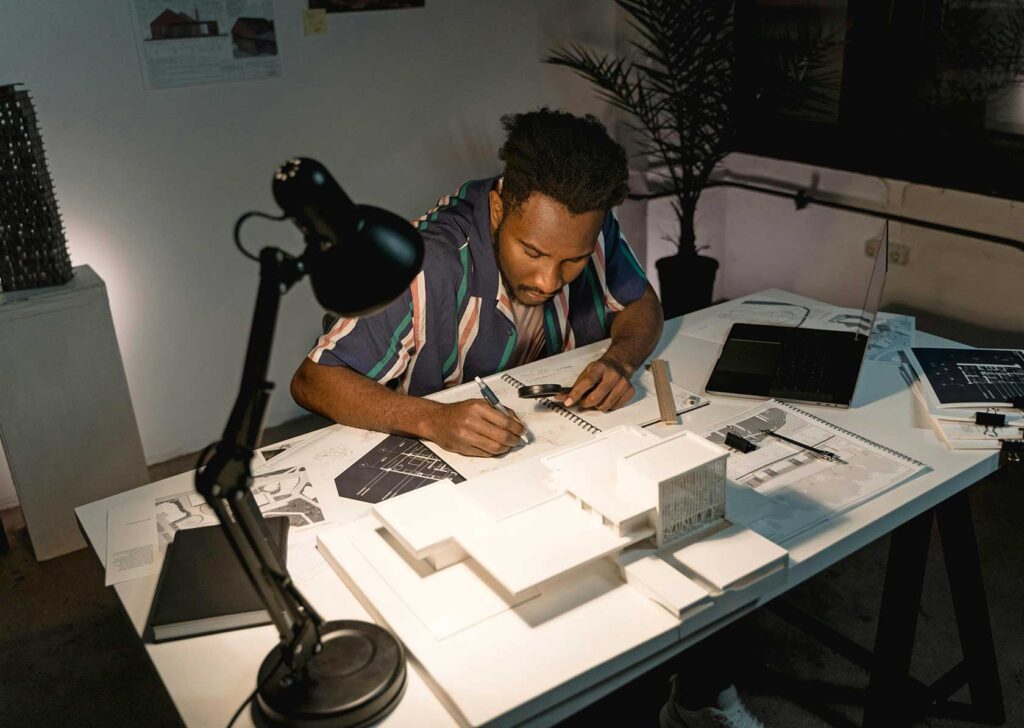Urban planning, but add some Afrofuturism
Black urban planners are redesigning Black communities as safe, functional, and optimal for health and well-being

Ever been to a Black neighborhood and wondered why there are more liquor stores than groceries? Minimal trees and nature walks? Rundown playgrounds and little to no sports courts?
A drive to the nearest high-income, predominately white community will look the exact opposite: supermarkets in excess, liquor stores but high-end, tennis courts, biking trails, lakes, waterfalls — the list goes on and on. These differences aren’t happenstances but are well-thought-out designs by urban planners, people who direct the development of cities and towns.
From food deserts to tree inequity, racist planning practices have left Black neighborhoods devoid of amenities that promote health and well-being.
But a new crop of urban planners is rising up to change that, using a blend of imaginative vision and practical solutions with roots in Afrofuturism. In reimagining our cities, Afrofuturism expands beyond being an artistic or literary genre. Instead, it’s a practical approach to addressing contemporary challenges, where Black experiences and identities are centered and uplifted. And it’s influencing key areas like spatial design, sustainability, transportation equity and environmental justice.
Creating a space for community in Dallas
Dee Powell, 32, is on a mission to bring economic mobility and spatial justice to South Dallas, an area that is 35% Black with the highest rates of poverty in the city.
In 2020, she founded Do Right by The Streets, a Black woman-owned urban planning and place creation group that crafts community-driven spaces. Her team’s latest undertaking is the Sunny South Dallas Food Park. The indoor and outdoor space invites Black-owned businesses to set up shop between March and December.
On a monthly basis, Powell curates the gathering at South Dallas Cultural Center across from Fair Park, an entertainment hub that displaced hundreds of Black residents in the process of being built.
“We are focused on finding a permanent space that people can gather at all the time, hang out in South Dallas, have meetings, connect, wifi, all of that,” she says.
Community spaces provide equitable access to many resources, such as the internet, greenery, and social interaction. These tools are known to have great health benefits: decreased loneliness, extended lifespan, protection against dementia, and lowered blood pressure and anxiety.
Long-term, Powell’s vision is to incorporate a business incubator and wellness amenities into the food park, including a community-owned grocer “where the community buys into it” and “they get kickbacks the same way you would if you were an investor.”
“Those are policy decisions.”
Long before becoming an urban planner, Powell realized every neighborhood wasn’t built the same. In Arlington, a suburb of Dallas, her parents first lived in a Black community with “a lot of fast food, check cashing places, pawn shops [and] gas stations.”
When they moved southwest to a higher-income area, it was “like day and night.”
“There’s a park in walking distance and it’s like a fully functional park that has a trail where people walk or bike. You see horses. They have multiple courts — basketball, volleyball, tennis courts, and now a swimming pool. You didn’t see that on the other side,” she says.
That’s when everything clicked.
“Those are all, of course, policy decisions,” she says.
Planning policy is the difference between a historic Black district remaining intact for another 100 years or being bulldozed to build a highway. It’s the difference between the installation of a new park or an incoming environmental hazard.
So, who has a say-so in the approval process? Many people do. The exact stakeholders vary by jurisdiction. Usually, residents are notified of pending changes, but only if they own homes. Renters are often excluded.
Powell says she approaches the community first and starts planning second.
She has seen white communities turn out in droves to protest an unwanted change, and “nine times out of ten, they come out on top.” Powell hasn’t seen the same response from Black communities, but she believes they have a lot more power than they think.
“I think they are a lot more disenfranchised and discouraged to continue to organize because they have done it, and in some cases, it has been met with retaliation,” she said.
The future of Black spaces
Imagine a future where everyday services in the Black community are within 10-15 minutes walking distance. And not just hair and nail salons: pharmacies, grocery stores, fitness and entertainment — all businesses that are economically sustainable. Black folks are building that future coast-to-coast.
In California, Thrivance Group, a Black woman-led urban planning firm, advocates “spacial reparations” or “what it would look like to prioritize joy, healing, and atonement.” In Portland, Oregon, Albina Vision Trust is transforming Albina, the city’s historic Black district, into a vibrant community anchored by parks, plazas, cultural event spaces and businesses. And on the East Coast, Jima Studio is engaging community members as they redevelop low-income housing, schools and historic buildings to include green space, sculptures and functional seating.
And Powell’s dreams of a revived Tulsa — or South Dallas — of the 1950s and ’60s, where Black folks thrived in health, community and business, could be on its way.
“The comfort of a proverbial Wakanda,” Powell says about her vision of Black communities 10-20 years from now. “You can do it all in your backyard.”
This story originally appeared at WordinBlack.com






